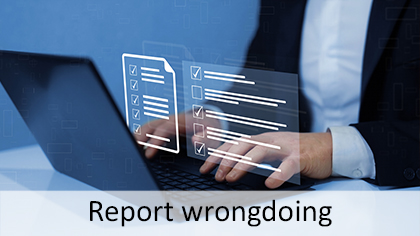FAQ

Is it mandatory to report?
Staff members of the Council of Europe have the obligation, by virtue of Article 1.6 of the Staff Regulations, to report wrongdoing. All current and former Secretariat members, members of CoE’s organs, bodies, committees and working groups, as well as persons involved with the Organisation’s activities and consultants and other contractors are also expected to report wrongdoing. Members of the public are encouraged to report wrongdoing should they become aware of it.
A report could concern wrongdoing committed by:
- all curent and former Secretariat member or a group of Secretariat members;
- persons involved in Council of Europe’s activities;
- members of the Council of Europe's organs, bodies, committees and working groups;
- Council of Europe contractors or their employees or subcontractors.
If you have doubts as to whether you should report a matter or not, please contact the DIO in a confidential manner. Failure to comply with this duty may result in disciplinary action.
How is the identity of those reporting fraud protected?
The Council of Europe will ensure that the identity of the reporting person is not disclosed to anyone, beyond the authorised Secretariat members competent to receive or follow up on reports, without the explicit consent of the reporting person. This will also apply to any other information from which the identity of the reporting person may be directly or indirectly deduced.
By way of exception to the principle set out in the previous paragraph, the identity of the reporting person and any other information from which the identity may be deduced may be disclosed in the context of preliminary examinations, investigations or judicial proceedings, including with a view to safeguarding the rights of defence of the person concerned. Such disclosures will be subject to appropriate safeguards.
If I report suspicions of wrongdoing, how will you protect me from retaliatory actions?
The Speak up Policy provides guarantees against retaliation. Attempts by persons alleged to have committed wrongdoing to identify a reporting person by subjecting colleagues to questioning or intimidation fall under the definition of retaliatory action and should be notified to the DIO.
Protective measures that can be taken by the Directorate of Human resources include, for instance:
- paid leave for the victim;
- transfer of the victim to a different service; and
- monitoring of the victim’s situation by a Human Resources Advisor;
- barring the alleged perpetrator from accessing the Organisation’s premise (where the alleged perpetrator is not a Secretariat member but another relevant person).
Interim measures that can be taken by the Secretary General include, for instance:
- temporary suspension of a Secretariat member;
- temporary exclusion of a Secretariat member from access to certain files or certain premises;
- temporary imposition of mandatory teleworking by a Secretariat member;
- temporary suspension of payments to a Secretariat member;
- revision of the duties and responsibilities of a Secretariat member; and/or
- imposition of any other limits on a Secretariat member’s official activities.
As a Secretariat member, do I have any other duties in addition to the duty to report?
In addition to the duty to report (see Question No 1) Secretariat members have the following duties in respect of fraud, corruption, or other wrongdoing examinations:
Duty of confidentiality
If you are involved in a preliminary assessment or investigation or otherwise become aware of allegations reported to the DIO, you must treat the information - including the fact that such a process is taking place - as confidential.
Duty to co-operate
Those conducting the preliminary assessment or investigation may interview any person who is reasonably believed to have information relevant to the investigative process.
A Secretariat member interviewed by those conducting the preliminary assessment or investigation has a duty to fully co-operate and disclose all information in their possession that may be of relevance. Failure to cooperate may give rise to disciplinary proceedings; however, no person shall be subject to disciplinary proceedings or any other penalty for failing to reply to questions that may result in self-incrimination.
Persons involved in the Council of Europe’s activities and members of Council of Europe’s organs, bodies, committees and working groups shall cooperate in accordance with any applicable contractual or other legal provisions.
Other persons invited to provide relevant information are expected to cooperate.
I am subject to an investigation, what are my basic rights?
Right to be informed
Where an investigation subject has been identified, this person shall be notified of the opening of the investigation once the Secretary General has been informed. Such notification to the investigation subject must be done without undue delay, taking due care that the securing of evidence is not jeopardised. The investigation subject must also be informed in writing of the nature of the allegations against them as well as the names of the persons who will conduct the investigation, the procedure to be followed and the time-limit for the investigation.
Right to be assisted
An interviewee who is a Secretariat member may be accompanied by a Secretariat member of their choice, provided that the latter is not directly concerned by the investigation and/or there is no conflict of interest.
Right to be heard
During the investigative process, the person suspected of wrongdoing will be given the opportunity to explain their conduct, to identify witnesses and other relevant evidence and to present information. They will be invited to read, add comments, and sign the interview record. Finally, they will have the opportunity to provide comments on the investigation report (if any), before it is transmitted to the Secretary General, and they have a right not to reply to questions or make statements that may result in self-incrimination.
Right to a due process
Those conducting investigative activities must be objective and independent, accountable only to the Director of Internal Oversight and may not receive instructions from any other persons. Further, they must report any conflict of interest that may arise in relation to an investigation, so that the investigation responsibilities are reassigned if necessary. During an interview, the person suspected of having committed wrongdoing may not be submitted to oppressive or misleading questioning or be subjected to any threats.
What should I do if I only have a suspicion but am not sure whether to report a matter?
As a general principle, you should reach out to the DIO or the Ethics Officer if you have any doubts about whether the actions or omissions in question constitute wrongdoing.
We kindly ask you:
- Not to wait to have sufficient evidence that fraud, corruption, or other wrongdoing has occurred in order to report a matter (it falls within DIO’s responsibility to consider what evidence is relevant and needs to be obtained);
- Not to conduct your own investigatory work before reporting the matter to the DIO (this might jeopardise any further investigative activities).
Please consider that even limited information or questions could sometimes be relevant, refer to information already received from other sources on the same subject, and merit further examination in that context.
The DIO has staff trained to examine suspicions of fraud, corruption, and other wrongdoing and able to carry out investigative activities in accordance with international investigative standards.
What is wrongdoing?
As set out in its Code of Conduct, the Council of Europe strives to uphold its ethos of professionalism, integrity and respect and the values that underpin this ethos, namely independence, trustworthiness, responsibility, dignity, diversity and discretion. Conduct which runs contrary to these values will amount to wrongdoing affecting the public interest. Actions which are not necessarily covered by the Organisation’s Code of Conduct but are clearly contrary to the public interest should be also reported (e.g. actions or omissions which pose a danger to public health or to the environment.)
Examples of wrongdoing:
- Retaliation means any detrimental action or omission, direct or indirect, against a specific person or persons, motivated in whole or in part by a desire to intimidate, penalise, silence, obstruct or punish because a report of wrongdoing has or is believed to have been made or an investigation into alleged wrongdoing has been conducted.
- Fraud means any illegal act or omission characterised by deceit, concealment, or violation of trust, perpetrated to obtain money, property or services; to avoid payment or loss of services; or to secure personal or business advantage, irrespective of the application of threat of violence or of physical force;
- Corruption means requesting, offering, giving or accepting, directly or indirectly, a bribe or any other undue advantage or prospect thereof, which distorts the proper performance of any duty or behaviour required of the recipient of the bribe, the undue advantage or the prospect thereof.
Fraud and corruption represent particularly grave breaches of the Council of Europe’s internal legal framework and are treated as gross misconduct by the Organisation and any suspicion thereof should be reported immediately.
Harassment is also starkly contrary to the Council of Europe’s values, breaches the Code of Conduct, and constitutes gross misconduct when perpetrated by a staff member. It is, however, to be addressed under the Policy on respect and dignity.
Other examples of wrongdoing include:
- a staff member breaching the Code of Conduct, and in particular the value of independence, by accepting instructions from a representative of a government or another third party;
- accepting a bribe;
- abusing the status of staff member of the Council of Europe or the privileges and immunities attached thereto
- failure to disclose a major conflict of interest;
- corrupt behaviour by a Council of Europe contractor, etc.
What are my rights with regards to processing of personal data?
Personal data is to be processed in accordance with the Council of Europe Data Protection Regulations.
Information about the protection of individuals with regard to the processing of personal data in the framework of activities carried out by the Investigation Division can be found here.
Additional information about the processing of personal data by the Council of Europe can be found on the website of the Data Protection Commissioner.
Those conducting fraud prevention and investigation activities are required to abide to the ACFE Rules of Conduct and Disciplinary Procedures.



